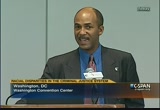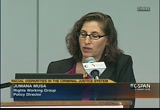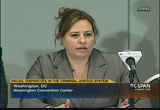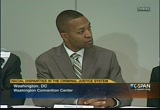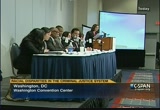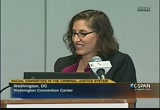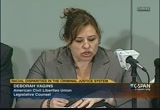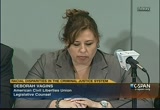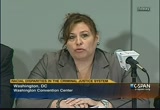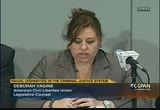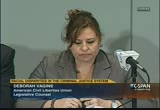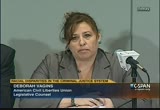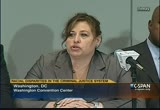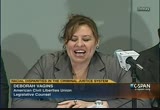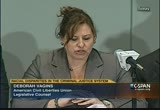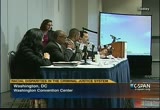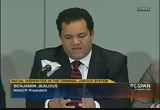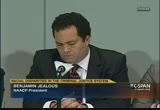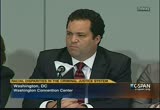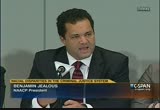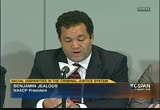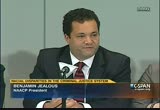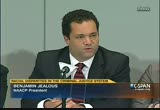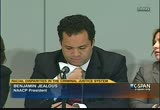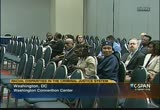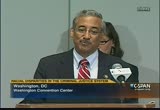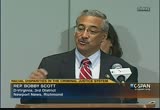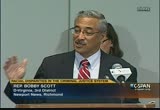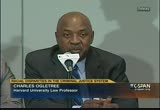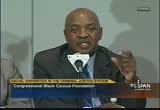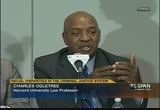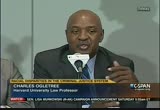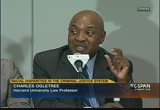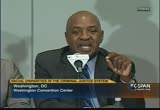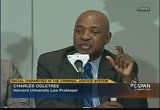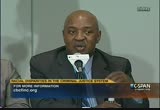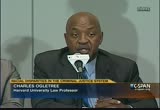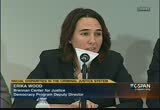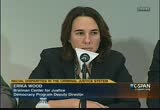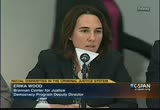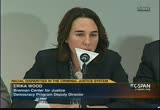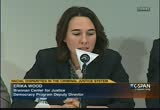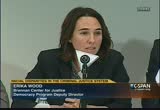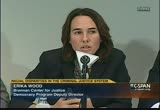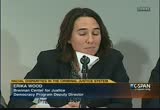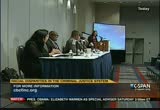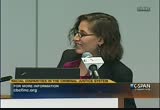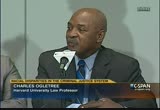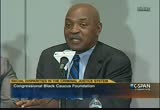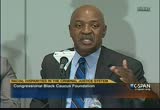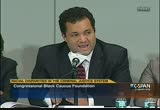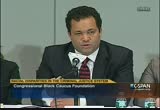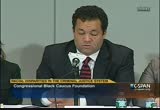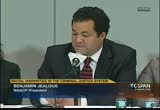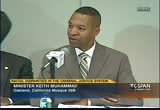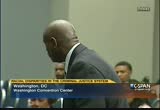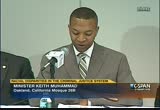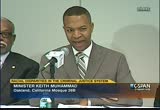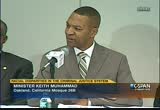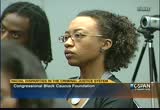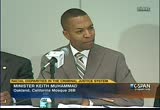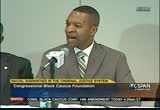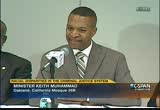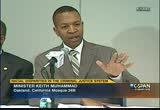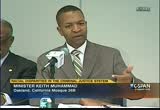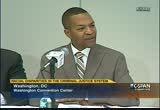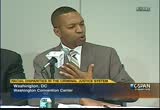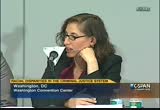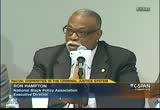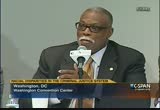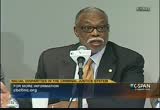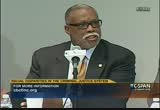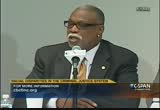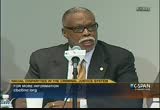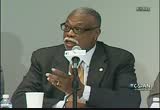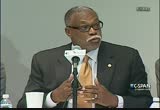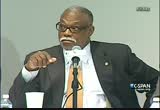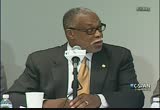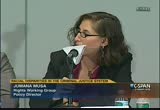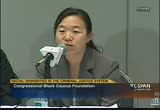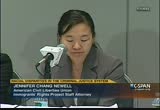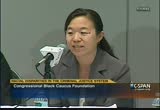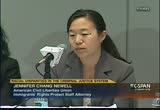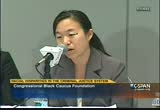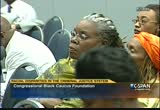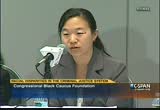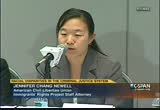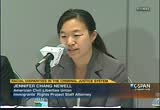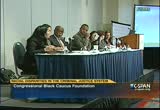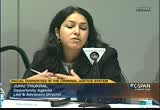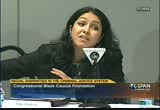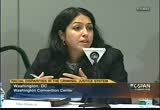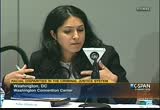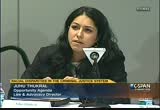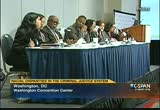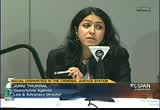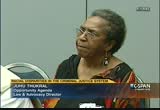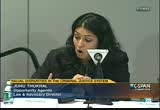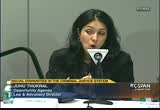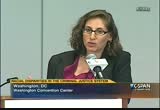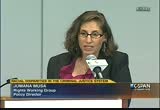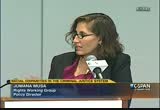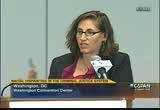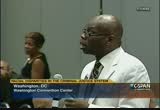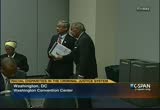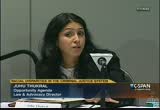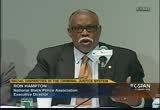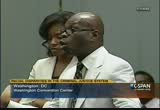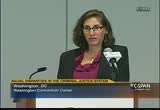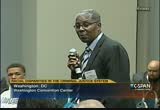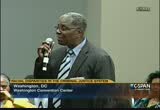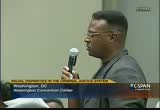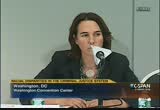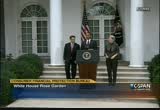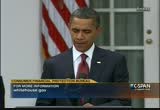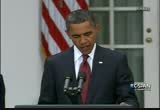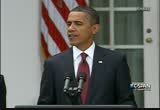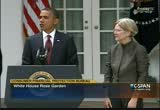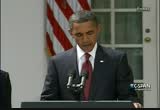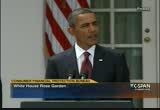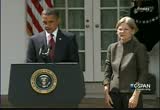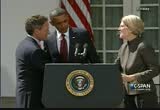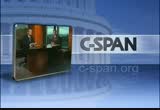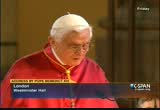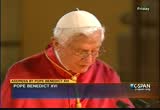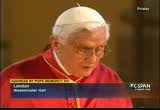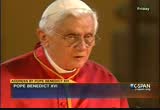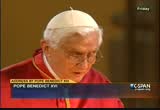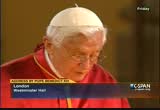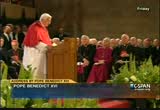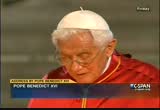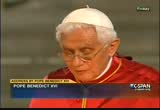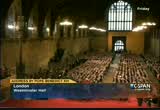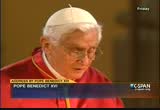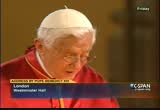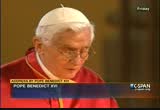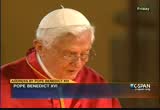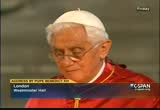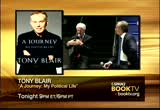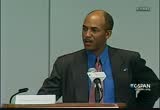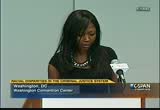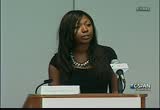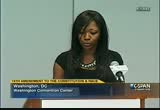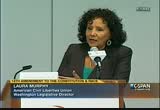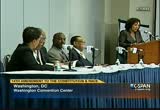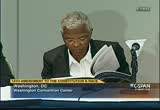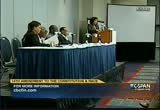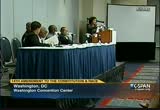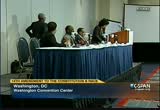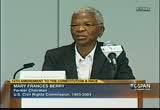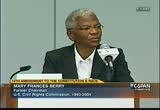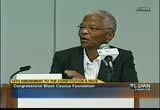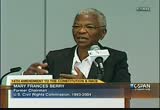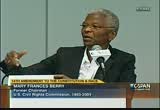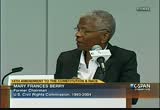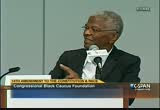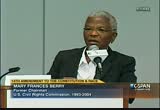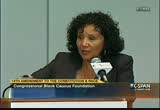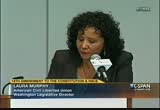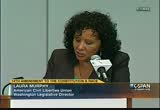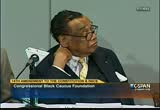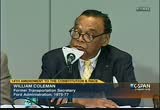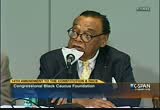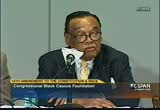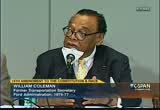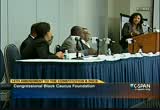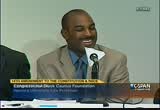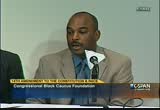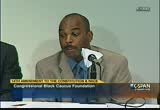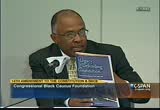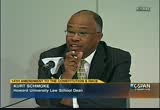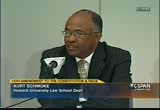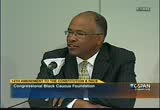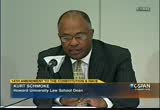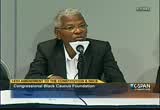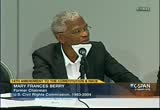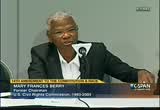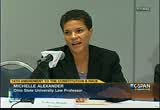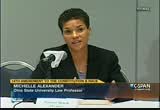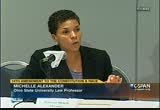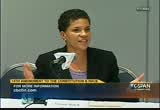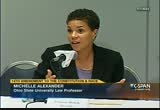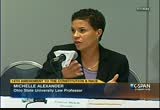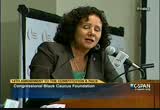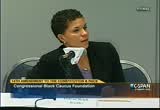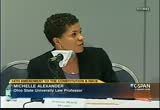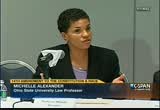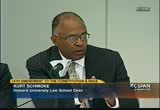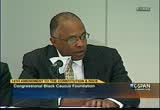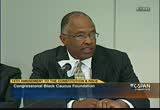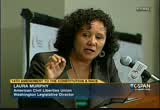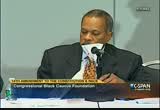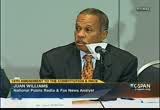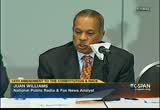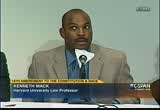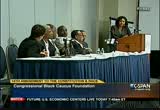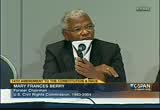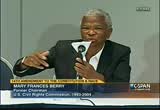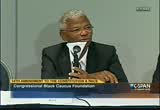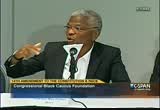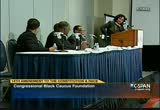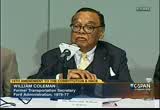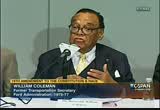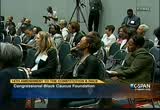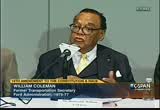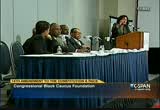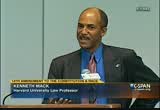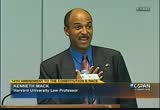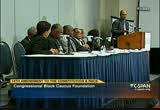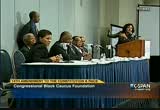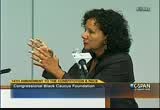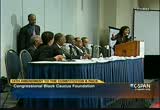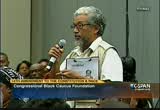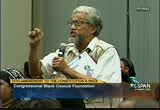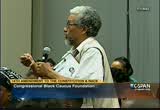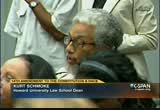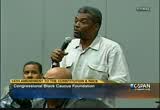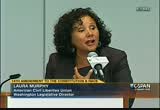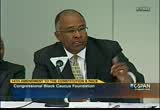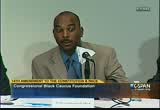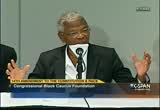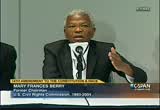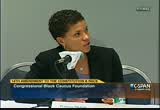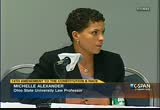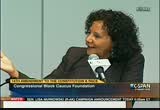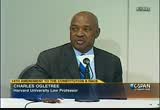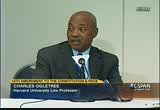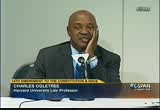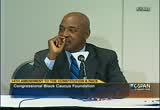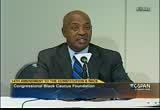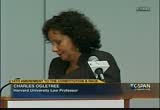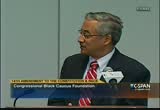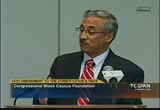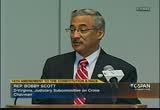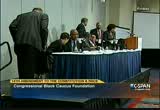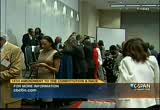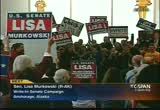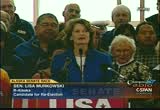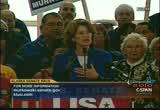tv Today in Washington CSPAN September 18, 2010 2:00am-6:00am EDT
2:00 am
introducing the moderator for the panel discussion. >> we have a panel of heavy hitters. they had interesting things to say. it will be my job to cut them off. we will at some point get to a discussion. i will take a brief minute. we are a coalition of national, state, and local groups. we focus on racial profiling because we see it as an issue that affects many communities.
2:01 am
it is an issue that leads to a lot of disparities in the criminal justice system as well as violence against people. many of the issues we'll talk about the day also had that effect. the group has conducted a series of hearings across the country to gather testimony from communities across the country. we will be issuing a report on september 27. that will be followed by a congressional briefing on september 30. we welcome you to attend. i will do a quick introduction of the people here. there bios are much longer than what i am going to read to you, but we do want to get to the heart of the issue of violence, crack cocaine disparities, all the things we know that have led to a disproportionate number of
2:02 am
low-income prisoners in our criminal justice system. i am it will go down the list as quickly as i can. this lady works on issues like the odor disenfranchisement and other issues. she is the senior adviser to the commission on civil rights. next to her is the president and executive officer of the naacp. he has also served as president of a foundation. to his right ear erica wood.
2:03 am
she directs the right to vote project. she has also worked on a number of campaigns around the country. i told you i was going to go really fast. immediately to her right is the representative of the honorable louis farrakhan. he is from oakland, california. he is here as a representative of the officer grant family. he was executed by police as he was laying face down on a platform at a railroad station. that officer, and surprisingly, was convicted of a minor involuntary manslaughter charge. he will be speaking on that.
2:04 am
to his right is ron hampton. he is the executive director of the black police officers association. he walked the streets of washington, d.c., for a number of years. he is intimately familiar with these issues. to his right is an attorney from san francisco. she has worked on issues of discrimination, racial profiling, and other constitutional rights of immigrants including ordinances that would not allow immigrants to rent housing. she will be speaking a little bit about that. at the end of the panel we have the director of black law and advocacy.
2:05 am
she has also worked as the director of the urban justice center and many other places. finally, we will be joined by charles ogletree. he is a prominent legal theorist. he probably knows more about these issues than many of us combined. he will be joining us. >> the aclu and the drug policy alliance are advocating for federal legislative change.
2:06 am
my coalition co-chair will be talking about litigation and state reforms. i am going to focus on the federal and legislative response, some of the history, and details about what i am talking about today. the aclu were some federal disenfranchisement from three angles. we litigate in court, will lobby in federal and state legislatures, and we engage in public education. as we face another important election, there are an estimated 5.3 million americans who will not be able to vote because of the result of criminal convictions. this is despite the fact that the supreme court repeatedly has said that voting is a fundamental right.
2:07 am
most with criminal convictions are barred from the polls. 48 out of 50 states have laws that bar citizens with criminal convictions from bidding in some manner. two other states permanently in franchise criminals with felony convictions. there are 5.3 million americans who cannot vote. 4 million of those americans are out of prison, living in our communities, working, paying taxes, but they were out voiced. most problematic is that these disenfranchisement of laws a disproportionately attack communities of color. it is mostly tied to the history of racial discrimination in our country. just a brief brought brown -- just a brief background, the laws have existed since post- revolutionary war era, but in
2:08 am
the late 1800's as part of the backlash to the reconstruction amendment, we sell an outgrowth of more of these laws for fear of losing political power. "white southern conservative politicians were tried to hold onto the region. the building lost in the state's could not overtly violate the constitutional amendments. in the 35 years after the civil war, 18 states adopted laws restricting voting rights of people who had committed certain crimes. by 1900, 38 states had done so. at the same time, criminal codes were being changed to reflect crimes that it was thought that
2:09 am
more freed men would be charged with. there were targeted convictions and targeted criminalization efforts. what we have seen over time is that there is a massive loss of legal betting rights for african americans. -- voting rights for african- americans. 2004 data that shows that at least 11 states have franchised at least 15% of african- americans. what we are talking about is stopping disparities in the criminal-justice system. as we know, in the criminal justice system people of color are more likely to be arrested, charged, prosecuted, in receive harsher sentences than whites.
2:10 am
the number of disenfranchised citizens as the land because of the incarceration boom and the mandatory minimums and the war on drugs. what we see, in my opinion, is a national disgrace. the cycle of discriminatory policies that diminish the boys of local communities. 70% of the people who have these conditions are in our communities, yet their voices are unheard in the political arena. i want to quickly talk about some of the other problems in addition to the fact that these laws exist. there is also the problem of defective disenfranchisement. every state is different. we at two states that currently disenfranchise. we have 46 states where it election officials are confused about what people's rights are.
2:11 am
there is not a lot of training or education of election officials. what's misinformation is given, it often spreads to communities. the damage is done. we see that there is a defacto disenfranchisement of eligible voters who are turned away because of this patchwork of laws. the report was conducted interviewing election officials across the country. a sample of that, in colorado, election officials it honestly believe that people on probation were ineligible to vote when, in fact, they were eligible. in tennessee, election officials were unaware of offenses that would permit the disenfranchised citizens. there are recent victories on the state level that we will talk about. i want to talk about the federal legislative response.
2:12 am
in order to reach enfranchise the citizens and we have talked about, it is necessary to have eight federal congressional response. in july 2009, represent the did conyers and fine gold introduced the act of 2009. the bill would restore the body -- the voting rights of the 4 million americans that have been released from prison and are living in the communities. it would make sure that people on probation do not lose their rights to vote in federal elections. it would notify people about their right to vote in federal elections when they leave prison, when they are sentenced to probation, or when they are convicted of a misdemeanor. not only will this bill creates this federal standard, but we believed it will strengthen our democracy by creating a broader and more just base of a broader -- of voter participation.
2:13 am
it would aid law-enforcement by increasing participation in civic life. justice marshall once noted that the denial of the right to vote to persons is a hindrance to the efforts of society to rehabilitate former felons and convert them into law abiding and rejected -- and productive citizens. this bill would largely resolve this problem with de facto enfranchisement because it would eliminate the confusion about who is eligible to vote. if you are no longer in prison, you are no longer deny the right to vote. we need to clarify that to officials. there has been broad support it -- broad political support for enfranchisement support -- reform.
2:14 am
civil rights groups have spoken out in support of criminal disenfranchisement reform. i have left sign on it letters from these communities that we have worked on compiling. there is a growing recognition among even conservatives that the smallest run contrary to our democratic ideals. the state level tells a different story. from 1997 until 2009, 16 republican governors in 12 states signed legislation, including george bush, charlie crist, and bobby jindal. notable conservatives has spoken out on it. this does not have to be a partisan issue.
2:15 am
in getting the hook. by continuing to deny citizens the right to vote, our citizens -- our government is denying them a voice in our democracy. we are advocating this federal legislation. thank you. [applause] >> i am going to turn it over to ben. >> good morning. it is great to be here with each of you and to talk about such serious issues. i want to continue in the line and talk a little about values, embodies do not need to be partisan issues. think about hope existing in this country toward the end of the 1960's and the civil rights
2:16 am
movement. the hope that parents had for their kids -- for black kids, for brown kids. my generation is all and told in the late 60's at early 70's that our job was to go out and reap what had been sown. we would be the first generation not to have to deal with the issue of segregation. we would be judged in most instances by the content of our character, not by our skin color or hair texture. we came of age just in time to find ourselves the most learned in generation in the country and the most incarcerated generation on the planet. in other words, freedom of having it did deserve segregation work for many of us,
2:17 am
but for some of us it got worse. look at the incarceration rates in what has happened since 1970. you'll find that we just do not have the most incarcerated black people on the planet, we had the most incarcerated white people on the planet, too. we are just locking up people like crazy in this country regardless. we are 5% of the world's people. we're 25% of the world's prisons. if you to get the white folks, it would still be 10% of the world's prisoners. the country has to come to grips with the way that this changes everything. people think about -- think they can solve the criminal-justice problem by a helping the schools.
2:18 am
in these times, state budgets are shrinking. what does not shrink? the criminal justice budget. what does train? everything else. we will be releasing a report early next year called misplaced priorities. we will work state-by-state and show held incarceration spending has gone up. next week in at least three states, will be releasing billboards and making a similar point. welcome to alabama where the incarceration rate has gone up 700%. welcome to california where we had increased spending on prisons faster than our public education. welcome to the usa. we have 25% of the world's prisoners. call the senate to get this act
2:19 am
passed. we have to sit back and get solutions. when people look at the issue it crosses partisan lines. we have succeeded in getting one of the state's to take the question of at you ever been convicted of of their applications. if a person is asked, they can have a conversation. from that application, the person is never considered for the job. they throw them away. that means a mother cannot get their kids out of foster care. when the father goes to court -- when the father goes to prison, the family is poor. but the incarceration rate. that was planned a lot of that phenomenon.
2:20 am
should it mom and she has a low level drug conviction be allowed to work at a pharmacy? probably not. should she be allowed to sell t- shirts? absolutely. people cannot even get a job holding t-shirts. in both cases, they are led by republicans. they're led by conservatives. they are led by people who are right-wing. they are led by people who go to church, the two synagogues, and you pray. those who stand for redemption, it should not be a political issue. it may be an issue of faith, but it should not be up for political debate. people have the right to redeem themselves, pay their debt to society, get out, earn a living, restore their relationship with their family
2:21 am
and their role in the community. at the same time, we have to get the enforcement part of the equation. just because the laws exist does not mean that they are applied the same way. white people or 55% of the crack dealers in the country. but people are 15% of the crack dealers in the country. this is going to be the dominant driver of how people used cocaine. people at this country use it -- people in this country use it at the same rate. 85% of the people locked up or using crack cocaine.
2:22 am
we have eight tolerance policy. we have one that is harsh. we see the same thing with marijuana possession. in new york city, black children are 20% less likely to have drugs in their pockets. yet they are for 25 times more likely to be searched. the criminologist in me cannot explain that. had you say to an officer that they are 25% less likely to have drugs in their pocket? the kids are more vulnerable. it is easier for cops to prey on them. if you are an officer, it is less likely for you to be challenged by their parent.
2:23 am
if you are in the upper east side, the white kids walking around with wealthy parents, they will never set their hands in their children's pockets. the impact of that, and i will close on this, will we permit our officers to fixate on small, low level victimless crimes and whether or not a child has a joint in their pocket, relative to homicide or rate, having a joint in your pocket is a small thing. we have committed these and entire cities -- we have communities and entire cities where hundreds of rape kits or un opened at this moment. we have to say to the officers, start at the top of the food chain. if you have not solved most of the homicides in your city, that you have hundreds of rate guess
2:24 am
that had not been opened, had you have time to throw a kid up against the wall and asked if he has a joint? some will say that there is a lot to be enforced. in the meantime, let's focus on homicide. this focus on a rape. the street people fairly. thank you and god bless. [applause] >> i want to take a quick minute to recognize the congressman. he has been a longtime champion on these issues. he leads the charge in criminal justice reform in many ways. i do not know if you want to take a minute or -- i have never known a congressman not to take a minute. [laughter] >> thank you. it will be just a minute because
2:25 am
we had a very distinguished panel and we want to hear from them. i chair the crime subcommittee. one of the problems we have had in criminal justice policy is that we have a choice of reducing crime. unfortunately, we have been with the slogans and sound bites for many years. we have locked up more population than anyone on earth by far. it is counterproductive. there are -- you are injecting more social problems into the community. it has created a racial differential with the african- american incarceration rate is 2200. in those countries is 50 to 200. if you put a portion of that
2:26 am
money into prevention and early intervention, getting people on the right track in keeping them on the right track, you reduce crime, save money, and give young people into the cradle of college in the cradle of the work force. it will take some political changes because people think they can get elected by codifying the slogans and sound bites. it will be a matter of changing the politics and getting people to notice that we noticed that all they are doing is locking people up and doing nothing to reduce crime just to perpetuate their personal political ambitions. to the extent that we can change that and let them know that we notice what they all are and are not doing, we can make a change in what we are doing. the congressional black caucus or supporting my bill. s debt of releasing money into
2:27 am
counterproductive prisons, but the money into a comprehensive ballistic approach we get young people on the right track and keep them on the right track. we know if we can get that passed, we can reduce crime and save money in the process. i want to thank our panelists for being with us today. i will stay with you as long as i can. we have to change the mindset of criminal-justice policy which is racially discriminatory, money wasting, and does nothing to reduce crime. thank you very much. [applause] >> you can see what we are fortunate to have the congress meant to share our committee and work on the issues on the inside. i'll turn it over to professor ogletree. >> i would like to salute the congressman.
2:28 am
the whole idea that someone is getting smart about crime rather than tough on crime is driven by the 21st century. what he has done is to go against the grain and go against his own party members. he has gone against oil and predictable democrats to solve the response is due lot more people ought to get more votes. i hope that everybody in every state will make sure that your members of congress, winning and men, will support the bill. it is the most impressive 20 per century effort to think about children as children and to think about early intervention in a positive way. i want to say a couple of things about the local phenomenon of criminalization and dental more broadly. there is good news.
2:29 am
as much as we sit here in washington and look at mandatory minimums and the disparity in crack cocaine, people are still being locked up even though we say the jails are overflowing. there is some good news. the governor of massachusetts, the only currently suffering acted-american governor, just signed last month 8 reform law. it is the requirement that any person with a record has to list that on an employment contract. the new law says that is no longer required. it is requiring companies to hire people with records. it seems revolutionary, but it is more on crime because people want to work. they want to be productive. they want to be taxpaying, wage earning citizens. that is a good thing. the reason they are not working is because they fill out an application and when that
2:30 am
employer sees he has a record, it goes to the bottom of the pile or is thrown out. they do not look at your skills or abilities. in massachusetts, that cannot happen anymore. we hope that becomes the bellwether. the national organization says it makes no sense to disenfranchise thousands and millions of people twice. once you cannot vote and then you cannot work. if you cannot blow and you cannot work, you are not a citizen. you can say they were born here, you live here, you went to school here. but you do not have the right to vote or work, you do not have citizenship. that is what we have done in massachusetts. that is the good news. the bad news is that across the country people are still saying if you have been in trouble, you cannot vote. if you have been in trouble, you cannot work.
2:31 am
many people who were involved in non-violent, personally inflicted criminal activity selling drugs -- we're not advocating drugs as a good thing. the point is, why criminalize someone severely? john conyers -- think about what he has done and what he represents. there is crime in detroit. there is crime in chicago. there is crime in los angeles. there's crime in which again, d.c. that you prevent it? you prevent it by intervening early. you give people a chance. what you are doing is to try and change the paradigm. my organization wrote a report for bobby scott.
2:32 am
our report sends a message. it is called "no more children left behind." there's no ambiguity about it. it is in acclamation of what we have to have. no more children left behind bars. that report tells us that intervention and treatment for the prescription that we need, not punishment and imprisonment. we have to turn it around. why is -- why are we winning this battle now? i go to my home state of california and what do i see? thousands of people are being released from prison. was there any epiphany saying that we should not punish people? no. they cannot afford to lock people up anymore. it does not cost productive. they have to release people not because -- they had to release people because they cannot operate the jails and prisons anymore. they could have been on probation. they could get the job training.
2:33 am
could have had drug treatment. it never happened. the goal is to not simply complain about the past, but to look at massachusetts and other places and say why can't people that have been in trouble not work? i can paint a fence, i can drive a car -- there are thousands of jobs that would help people do more. the nisei one more thing. under this president and this congress, last year we had the passage of the $787 billion stimulus package. how many people here know about the stimulus package raise your hand. that is a good sign. how many people know how much money york state received in stimulus package raise your hand? the kit that. they do not know. if you do not know. there are tens and twenties and
2:34 am
30 millions of dollars in your state right now to be spent. it is not getting down to the cities. you cannot blame the president or congress. they did what they were supposed to do. $787 billion divided among the 50 states. it is for roads. it is for bridges. it is for construction. in massachusetts, you have to talk to your governor and politicians about being created. it is easy to say you use this money in massachusetts, new york, illinois, california, texas, wherever it might be -- you are going to make sure that you hire skilled workers. that is fine. this is what governor patrick did. he is saying that money has to be used for skilled workers, for semi-skilled workers, and for unskilled workers. what does he mean by unskilled?
2:35 am
he does not mean that people have no skills. he means they are people who have never been in the union, they had never been certified, but they know how to build a bridge. they want to work. the idea is -- this is not a progressive idea, it is a sensible idea. why not use this money to employ people? if they are not working, you'll find that they are doing things that will be counterproductive in society. this is not being tough on crime, this is being smart about crime and smart about resources. i hope everyone here will look at this tracking for change and ask what has my governor, what does my mayor, what does my senator, what have my people died in my city, in my district, in my county to spend money to put people back to work? if they do not put people back to work, they do not deserve
2:36 am
your vote. they do not deserve your vote. if you are not spending money on us, i am not going to be spending my god-inspired constitutionally protected right to vote on you unless you show me you are doing something for us. we can change this by simply saying, a job not jail. job's not jail will be the priority going forward. i hope you'll find some way to do that in a powerful way. thank you. [applause] >> erica? >> i had the unenviable role as speaking after him. i am do my best. it is a pleasure to be with you today. i want to say a thank you to the part congressional black caucus. it is a pleasure to be here and to know that people are thinking and talking about these
2:37 am
incredibly important issues. we work on the election and voting rights issues. i am particularly passionate about those with past criminal convictions. i came to this issue because about seven years ago my administrative assistant who was just coming all parole try to register to vote and got a letter that he had to produce about 25 different documents, none of which he had. he came to me and said what is this all about? i said that this seemed wrong. i was seeing a lot of different reentry work. we started calling around and looking into it. it turns out that more than half of the counties in new york state were crying people with past criminal convictions to jump through hoops before they could vote. that is allocated this issue. it was just one guy with a piece of paper was being denied the right to vote even though he was
2:38 am
eligible. i am delighted to say that he will be speaking to me this afternoon at a rally. if you are inspired by our conversation this morning, we hope you join us to build support for democracy restoration act. i want to talk a little bit more about the issues and about where the states are on this issue. there is a report out there -- it looks like this. there is a map where you can see what the states or. you can see it the patchwork across the country. it ranges from two states, kentucky and virginia, which partly disenfranchises anyone with a felony conviction. you lose the right to vote for
2:39 am
life in their states. you can apply for clemency and ask the governor to restore your rights. you have to go to an application procedure. it is entirely at his discretion. he decides it is to vote in his state. under some governors, that number drops precipitously. it is purely discretionary. it is entirely within the governor's control. the result is hundreds of thousands of people are disenfranchised in the states. that has a disproportionate impact on communities of color. we have been working with our partners at the naacp and the and say it -- and the aclu to change that. the results or that two states still disenfranchised anyone with a felony conviction. it will not surprise you that florida, alabama, mississippi, and arizona have permanent disenfranchisement are at least some people with criminal
2:40 am
convictions. there has been -- i want to talk about it -- the introduction to our report. a number of these laws are firmly rooted in jim crow. we need to be very clear about this. these laws have been on the books for a number of years. they came into being right around reconstruction and were intended to keep african- americans from voting in our country. you can read to the constitutional convention. you can read the quotes for the delegations from virginia, florida, mississippi, and alabama. it is very clear that they were targeting african-americans and tried to keep them from voting right alongside poll taxes, literacy tests, and anything else that the voting rights act has eliminated. these remain on the books.
2:41 am
there is a massive disenfranchisement of committees of colors. these disenfranchise entire communities. if part of a family cannot vote, the family cannot vote. the children will not vote. it is not surprising that these are rooted in jim crow in the southern states. even in the states that are considered a beacon of norman -- of northern freedom, they are also rooted in discriminatory laws. we went to the new york historical society. we went to the legislative libraries in albany. we did research around the country to find out where this law came from here in new york. it turns out that when you go back to look at the state constitutional conventions and the old constitution which are actually pretty fun to read, it turns out that new york was the only state in the country during reconstruction that put in the
2:42 am
state constitution a specific property requirements are african-americans. they had to learn a certain amount of property in order to register to vote. they had to own a certain amount of property before they were registered to vote. the state on the books in new york for years and years and years. the only reason it was eliminated was because of the 14th and 15th amendment. all the many other states had got rid of this property requirements, new york kept it on the books until the 14th and 15th amendment forced it to remove that. new york delegates did not want to end at the 15th amendment. they voted against it. at the time that the 15th amendment required new york to remove this requirement, it put in place its criminal become -- is criminal disenfranchisement law.
2:43 am
you can read the conversation on monday state delegates when that decision was made. the language in there is astonishing. it is disgraceful. the law in new york, which most people think is a liberal northern state, continues to have that effect today. 8% of the people that are disenfranchised are latino and african-american. 80% of the people disenfranchised in new york or people of color. there are so many issues when people are coming out of prison. this had been described here today. people need jobs. people need to get their families back together. when you talk to people who are impacted by these laws, the right to vote is a significant slap in the face. it is a symbolic denial of being a participant in your community. there has been tremendous momentum across the country in the last decade.
2:44 am
20 states that either restored betim writes for use the restoration process. many of those have been supported by a bipartisan controls. we have worked on all of those campaigns over the last five or six years. in iowa, the governor restored building rise to 80,000 people in the state to the executive order. in florida, gov. chris used his executive authority to change the laws there. the voters went to the polls on election day and restored building rights there in rhode island. there are lots of different ways that states have dealt with this. the tide -- it is time to recognize that this is a scar on our democracy. it is continuing discriminatory impact on communities of color. we are hopeful that this federal bill, the democracy restoration act, will do that across the
2:45 am
country. i am getting the hook. i do want to say that at 11:30 we have organized a rally at the university of d.c. law school. we hope you'll join us there today. [applause] >> with the recognition, we are about to lose a couple of our panelists. i want to pause briefly to get some reaction between the two of you. we would do more discussion later, but i know you have to go. we have heard quite a few things. either about the fundamental framing of how this works, not just the community effects, but what does it mean? the rhetoric is that because we stopped and frisked every black or brown used in new york, that is what we have less crime.
2:46 am
what we do not here is what happens when you take young men and women out of the economic system. you take them out of the ability to have jobs. you take them out of the mainstream and treat them as second-class citizens or not citizens. what does that do to communities? we heard a little bit about that today. do you have any reactions to each other or anything you would like to add? i want to give you the opportunity before you step out. >> i think what comes through in all of these presentations thus far is that there is a new south and it is not georgia, mississippi, north carolina, or south carolina. it is new york, massachusetts, ohio, illinois -- they are doing things you could not even imagine what happened in the 20 per century. i think about new york and all of the issues of
2:47 am
disenfranchisement. new york and brooklyn had this practice of the police stopping people without any evidence of a crime. the vast majority of people were released without being arrested for any crime. yet the police wanted to keep those individuals in their database as possible resources for future crimes. that is unthinkable. that is worse than south africa. if you -- you did not commit a crime, but we want your name and address in our data base for the future. the bad news is that there is a new law that may have an impact around the country. we promoted the idea that we can all be reporters and investigators. will we see crime promoted by police, will use our cell phone and other devices to videotape it. not to intervene, but to show the police violating somebody's
2:48 am
rights. there is now a law in massachusetts that a police officer can arrest you if you are recording him or her doing something wrong because it violates his or her privacy. think about that. protecting the police from an individual, a citizen. think about rodney king, what would have happened if there was no one with a camera that the police did not see. we would have never known. the reports they wrote the next day told a different story than what our eyes told us that they did. these things are happening. the regressive effort is happening everywhere. arizona is a good example. i mention racial profiling in my new book. how does any police officer what ever raced he or she may be, how did they know when they look at you if your an undocumented worker or an arizona citizen? they cannot know.
2:49 am
it puts an unfair burden of the police, but it also tells us that we are solving some criminal justice problems. there are new things creeping up. it is not alabama or mississippi. they are bad in alabama, mississippi, georgia, and now -- and north carolina. but in the other states, we have a big problem. we are fighting some of the most problematic issues. at the same time, there are things creeping slowly into blue states and into what we think of this democratic states. they are bad for citizens and they are bad for justice. we have to be vigilant wherever we are and not keep folks somewhere else. the problems are very big right in front of our faces. the aclu and the naacp or putting these things out and making sure that we fight against them in places where we
2:50 am
think they are not an issue. >> we talk about this law in massachusetts where you can be dealt with by the cops did you videotape them. that should make all of us realized that it is not just about this country. when i worked with amnesty, one thing that was drilled home is that we make a bad law here, the amplification overseas is much greater. when we passed the paycheck act here, it was permission to dictators from west africa to the far east to do horrible things to their citizens. our country is a beacon for human rights. whenever we take a step backwards here, we take a leap backwards overseas. as a citizen in this country, if we can be told that they are
2:51 am
violating the law by it videotaping an officer, never that bad will literally make a huge impact overseas. it was a comment made earlier that really should get all of our attention. we have to speak up. there is a connection between the nine people jobs in the increase in the incarceration rate. one way or the other, we will pay for this recession. we can either invest in the country we want to be, we can create opportunities in places where there is little at this moment, or we can pay for more incarceration and more foster care. that is why we have organized a big rally on october 2. one nation working together for
2:52 am
jobs, justice, and great schools for our kids. we need people to turn out. we already have 16 buses heading into the city. we have people coming by car. there are people coming from utah. the obstructionism in the senate right now is holding up job creation. we have made some big strides even on criminal-justice reform in this congress. we have narrowed the gap between sentencing for pallor and for crack. there is a lot more to be done. we need to be champions. as an organizer in harlem, i was taught that when you elect somebody, you did not elect them to make the change for you, you
2:53 am
elect them to facilitate the making the change. we have always been the change we are waiting for. we have disempower ourselves. going back and saying we have -- going back and say it is time to rest, no, no, no. 2008 is the beginning. you need to raise our voices and get people fired up. we need to turn out as many voters as we can and get people fired up for november 2. we need to make this country better bit by bit. thank you. [applause] >> that website in onenationworkingtogether.org. we will continue with our panel.
2:54 am
>> thank you. every important event in my life i began in god's name. i greet you through the words of peace. we say it in the arabic language. peace be on you. i am grateful for this opportunity to share with you some of our concerns coming out of northern california. we are here specifically to address the matter of justice in the murder of a young man who was killed for the world to see on videotape by a abart police officer which is the train system for northern california. wheat -- with us here today is the oracle of oscar grant to
2:55 am
less traveled with a delegation from northern california to share some of our concerns for what has happened and prevent any of these kind of happenings from occurring again without proper intervention and oversight in law enforcement practice. i would like to introduce "uncle bobby" who is the uncle of oscar grant. if we review the case momentarily, on january 1, 2009, a 22-year-old man and his friends after celebrating the birth of his brother in northern california, headed out to enjoy new year's eve. after leaving the family home where his mother said to her 22- year-old son, "there are a lot
2:56 am
of people drinking tonight. do not drive. take the train to your new year's eve celebration." on his way home from the celebration, after the boarding a train in east oakland, oscar and his friends were approached and separate the immediate consequence of racial profiling inside the station. what we saw before he was murdered was the fatal consequences of racial profiling in america. as he and his friends got off of the train, they came under verbal and physical attacks of one particular officer who, in a 13 minute incident, precipitating 11 minutes of
2:57 am
verbal and physical abuse oscar grant and his friends. he hurled racial epithets. he body slammed. he kicked. he elbowed and he need a group of young men. oscar grant and his friends or never arrested. they were never charged for any time -- for any kind of crime. within 13 minutes, oscar grant laid flat on his face with nearly 600 pounds of police officer on his back. one of those two officers stance and shoots him in the back. after realizing what he had done, that officers said to his peers, "i thought he was
2:58 am
reaching for a gun." this was on january 1, 2009. by january 3, 2009, videotaped evidence of what occurred was released from a passenger's personal camera. prior to the videotaped evidence being released, the defense offered by the police officer was, "i thought he had a gun." after the release of the videotaped evidence from a passenger, it is interesting to note that there are now lawless sweeping across the country to prevent citizens from videotaping law enforcement officers in the condition of their duties. that is as though the video tape somehow impede the operation law only as a law-enforcement
2:59 am
officer. on my way here, i watched a videotape on dallas, texas, of the rodney king like ants the debt with the beating of a young man was captured by the law enforcement officers on a video camera. they did their best to suppress what had happened to the point that one officer even moved the camera while they were beating a young man in public view. this is only to say that we are witnesses of the fatal consequences of racial profiling. not only were we able to see this being on television, but anyone with eyes saw it. as a result of our viewing of this video, we were all enlightened, enlightened, and enraged by what we saw. not only did we see it in our homes, but all of our elected officials we want to thank for participating in this journey
3:00 am
for justice, saw it as well. one of our congress persons said last night that oakland is the most diverse city in the country. as a result of that diversity, having a black congressperson, having a black state representative, had been black city council people, having a black mayor, and having some black county supervisors, we were able to include in the voice of outrage on this incident not only the family of oscar grant, not only the committed the leadership, not only the young and old, but there were black elected officials in position to voice their concern over what had happened. to be frank about it, if black elected officials refused to voice their concerns over what
3:01 am
4:20 am
on c-span2. >> good morning. i'm counsel to the house judiciary committee and chairman john conyers, and we have the pleasure of welcoming you today to the panel on the history of the 14th amendment. we would like to start the panel today by introducing india juranmo who was in the 6th circuit who is a historian with respect to the 14th amendment and his foundation supports education on the amendment as part of the civic understanding
4:21 am
of all americans. i would like to give the podium to him and give us an outline of the keith exhibit. >> good morning. i'm i india juranmo. on today's panel marching towards justice of the 14th amendment of the u.s. constitution is being presented by the keith collection and congressman john thomas j.r.. today's panel congressmen rates the exhibit at pcp's annual legislative conference this weekend. the march towards justice exhibit is of the keith wall collection which was started as the central repository for our african american legal history. this focuses on the 14th amendment to the u.s. constitution and the struggle to make the united states a true democracy. the 14th amendment was
4:22 am
established in 1868, but it was not enforced for african americans until the late 20th century. it was established to define what it means to be a citizen of the united states. our distinguished panelists will discuss the historical significance of the 14th amendment especially in light of recent challenges to continue relevance. at the conclusion of the institution, there's a tour of the exhibit on display at the l street bridge between this building and the building agas ept to it. i'd like to thank our sponsors to the program, the gaining counsel to help sponsor today's program and thanking the contributors towards the exhibit which include the gm foundation that has enabled the exhibit to travel all around the country. i'd also like to acknowledge the curator for the marching towards
4:23 am
judgment exhibit, smith, who created the exhibit and bob, if you could just raise your hand. [applause] now, please join me in welcoming laura murphy serving at today's moderator until we expect juan willams to arrive. he returned to the legislative office to serve as the director. prior to to her return, she directed her own firm where she utilized her 30 years of policymaking and political expertise to advise nonprofit clients at the national, state, and local levels. she is well known for her advocacy on human rights and civil liberties. she have communications campaigns on criminal justice, first amendment, equality, and national security issues. she has been a frequent guest on
4:24 am
pbs news hour with jim lar and other news programs. please join me in welcoming ms. murphy. [applause] >> thank you very much, and i was asked at the right before i walked in if i would agree to moderate the panel, and i couldn't be more honored to moderate instead of present. i want to weigh in on the amendment, but what you have in front of you is a tremendous -- really civil rights icons, and i'd like to start with william t. coleman. many of us know secretary coleman of the secretary of transportation in the florida administration, but what many people don't know is how instrumental he was in the naacp in the funds legacy, and he was
4:25 am
also a member of president dwight d eisenhower's employment policy from 1959-1961. what i'm trying to say to you about secretary coleman is not only does he practice law or serve in government administrative positions, but he is an architect of the civil rights laws that we now enjoy. i want to move to mary frances berry, also another icon. she is the professor of law -- professor at the university of pennsylvania and you are also at the university of michigan where you received your ph.d. in history and your jd from michigan law school. she's written so many books. her most recent book is on the history of the united states commission on civil rights, and that will just give you the
4:26 am
engine -- ins and outs how he ended up with the dysfunctional commission, but doing her era and prior to it, she made sure the u.s. commission on civil rights did the job it was supposed to do that was to oversee the state of the nation's civil rights issues whether it was dealing with voting, employment, health care, immigration, native american rights, racial profilings, she was instrumental in holding hearings all over the country, some of which led to legislation. i have to also fake a personal privilege in introducing dean kurt schmoke, deen of harvard law school. he was known as one the most thoughtful mayors in the nation, and he really changed the face of baltimore.
4:27 am
he isn't given adequate credit for all the people he put into place in the leadership of the city who are still serving in key positions in baltimore, and he has been a transformative dean at university law school and refreshing the faculty, keeping it fiscally sound, raising money, and it's with great affection that i introduce mayor kurt schmoke. juan willams i will introduce later on, but i want to introduce michelle alexander because she has a special history with the aclu. i got to see her in her early days heading the racial justice project of the aclu of northern california. she was quick and smart and piercing in her analysis, and as soon as we all met her, we knew she was going to be a national leader, and now she's moved to ohio. she's had children. she's gotten married, but she's
4:28 am
come out with a block buster book on the problems with racial profiling and race issues in the criminal justice system, the new jim crowe and also teaching, also a mom and she's very much missed by the aclu, i have to say, michelle. we will also be joined by, i think charles olgetree, and now let me get to mr. mack. he is a professor at harvard law school where he taught the 2000 school year and a member of the 2007 and 2008 class senior fellows by the fletcher foundation. he teaches in legal history and working on a book right now tentively entitled "the race civil rights lawyer from
4:29 am
1920-1955. requests i'm excited about your research. please give our panelists a round of applause for agreeing to be here ag to all together. [applause] i hope there are pictures taken of this. i'd like to call on mary frances berry to talk. >> oh -- >> you don't want to go first? >> i can do whatever. >> okay. [applause] >> all right. thank you very much for coming, and i am honored to be on this panel with such a distinguished group of people. aside from the activism i was engaged in in my life, i'm a historian and a lawyer, and i believe in the importance of
4:30 am
history, knowing some history in terms of trying to figure out what to do right now, and it's not because i think that whatever happened before was exactly like what's happening now, but i don't think you can figure out what's going on now if you don't know any history, and you can't figure out what to do. i said that to someone this morning who asked me that they said they were puzzled by the reaction from some of my neighbors and i live in an integrated community to the election here in washington the day before yesterday, and i said, well, why are you puzzled? the history of cities, if you read about the history of cities, you ought to think about this, another big city, that people who had money and were wealth lived in the cities first because it was convenient. then they moved to the suburbs with the cars, and then middle
4:31 am
class back people to the suburbs were there, and now it's not convenient, so now they want to move back to the city, which they are, but there are certain things required for them to move in and have what they like to have whatever it is in the city. well, if you understand that and understand how that process goes, you're not surprised by anything that happens. anyway, to the 14th amendment. i think the most important thing about the 14th amendment historically, and i just thought of this theme last night, yesterday, and thought about it yesterday in my seminars that i teach at penn on the history of social law and change, and i thought about it last night and this morning that when mr. justice miller wrote the opinion in the first supreme court case in the 14th amendment called the slaughter house case cases, we're always quoting the the part where the one provading
4:32 am
purpose of these amendments was to correct the history that had taken place right before that with black people being enslaved and then freed, and then finally to make them citizens of the united states and to deal with trying to have equal protection and due process and the like for the african americans, or negroes as we were called then, under the constitution and that's what the 14th amendment and other amendments were about, and i used to say that all the time and loved that one pervading purpose language. now i decided the most important language was not that. it was the part where he said it doesn't mean that the negro is the only one who can use this amendment. the fact that it was the one pervading purpose because since the 14th amendment was put p on the books, it has been used positively by people who are not negroes more than by negroes, and in fact, it has been used to
4:33 am
suppress the whites of after -- rights of african americans. if you look at the whole span of the history from the 14th amendment as often or more than it was meant to do otherwise. what does that tell us? it tells us figuring out why something was passed or added to the constitution doesn't help you. you have to know what happened after that and use it for you even if it was designed to be used mainly for you in the beginning. now, what i mean by used against us. in history courses we talk about after the reaction that took place after african americans and civil war and after reconstruction, and how corporations used the 14th amendment to get their way and be protected by government regulation and blacks lost those cases through litigation. you know the cases.
4:34 am
we finally get to browne and glory hallelujah, they decided something for us. i'm here to tell you since brown was decided and after a case decided in the early 20th century case incorporating the rest of the bill of rights into the 14th amendment has been the source of more litigation and more cases and more protection for people not that some of the issues that were involved didn't protect african-americans too, but it didn't have anything to do with black people really. in fact, the whole agenda. aclu which laura works, the entire agenda wouldn't exist -- well, you're 1st amount cases would, and cases directly against the federal government, but all the cases in the states were against affiliates and all the nacp chapters and all the
4:35 am
organizations and the lgbt issues, the human rights campaign funds and the rest of the cases you hear about. none of them would have existed without the 14th amendment and incooperation and in definition of the 14th amendment that had nothing to do with any black people. when justice harlem died, people crowded into his funeral, as well as they should have and cried because they have di sended when backs were turned on blacks. the lawyers like bill coalman and litigators and charlie houston and the civil rights lawyers who tried to use the 14th amendment to increase opportunity and to get equal justice for african-americans and were successful in instances
4:36 am
are under attack in the history profession by some historians, not kenneth, he's not one of them. i don't know, are you one? no. who claimed they didn't do the right thing. they never should have brought brown in the first place because it was about education and helping the elites and teachers and didn't help working folks, which we know is not true because the policemen and firemen. they also used the best legal strategy that would win at the time and that's by coming up with what you think can win at the time you use it and what the constituents want. keeping that in mind, here we are today. we have a lot of people talking about using the 14th amendment for things and birthright citizenship and should it be somehow modified because undocumented or illegal workers
4:37 am
are people coming to the country or they somebody said, some right wonk come, mothers come and have babies or something, and they became citizens and we want to outlaw that. can we change the 14th amendment? even though the 14th amendment had the limited ability to help the situation of african-americans compared to all these other issues, it still is important and is the bedrock of any possibility opportunity of any, all the statutes that we use, the civil right statutes and the like are based upon it. when people start talking about opening up the 14th amendment to debate on the floor, that's just like saying let's open up the 13th amendment and whatever anybody says, i might go home and be a slave because when they are finished you never know what they'll do.
4:38 am
it was important at the time, but i thought a few words of history might make you understand the things going on now and it is relevant and be able to figure out what to do next. thank you very much. [applause] >> the reason i called on mary frances berry first because she has a historian and can put it into context. with the rest of the panel, i'll propose a series of questions, and so we won't have a preliminary opening statements, but one footnote, two footnotes i want to put on what marry freenesses berry said is number one she is right. the 14th amendment is under discussion. there will be hearings in the senate, maybe in the house, probably not if mr. conniers has anything do with it, but this is a opportunity for a history
4:39 am
lesson that a lot of the nation needs, and so why is the 14th amendment relevant to this panel? it's because the people who want to open it up want to deny citizenship to immigrant children born within the united states because immigration is a huge issue. to put a second note on what frances mary said. the framers intended the result not only their di sen daunts, but other groups as well. this reflected the exchange between supporters of the 14th amendment and strong appoint the of both. they expressed reluctance to anticipated the constitution in such a way to tie the hands of the specific states to prevent them from later, mary frances, later deals with the chinese as in their wisdom to see fit.
4:40 am
the supporters of the citizenship klaus responded by confirming intent to constitutionalize the u.s. citizenship of children born in the united states to alien parents. i'm desire yows to have a definition of the citizenship. is the child a citizen? is a child of a gypsy born in pennsylvania a citizen? the proposition before us relates to the children begotten of chinese parents in california and it's proposed to declare they shall be citizens. we declared that by law, and now imposed to corporate the same fundamental strurmt i'm in favor of doing so and he was for african-americans. i want to give you that piece of history because the immigration issue came up in the 14th amendment although it was largely designed to deal with the problems of rights of african-americans, but secretary
4:41 am
coleman, in your litigation career and civil rights, during the war in court, it was my understanding that you had much more latitude to declare things more of a 14th amendment violation because you did not have to prove during that era so much intentional discrimination. you could show the effects of discrimination, and the court in the years afterwards have narrowed our ability to use the 14th amendment effectively. can you tell us a little about the effect of the 14th amendment and experience of any cases you worked with? >> well, i always had the advantage of -- >> hold the microphone up -- >> i always had the advantage there was a gentleman named marshall who led the team and charlie houston, and i would think those three had a lot to
4:42 am
do with the result that we came about. frankly, i thought that the 14th amendment really implied and meant that thereafter people of color who had been slaves before were american citizens and had all the rights of american citizens, and you conned discriminate against them based upon race. i actually won that argument not in a court once, but in a meeting of the cabinet of president ford when boston wanted to say it didn't have to bus children of color to where they could get an education and the best schools integrated schools rather than in rouxburg, so we were really didn't know what i was
4:43 am
supposed to do today. i thought i was just to show up. [laughter] you just have to suffer me. you know, you got to know all the cases. i think that everyone here should read a book which mr. justice published about four days ago where he says how do you handle issues under the constitution which will take care of the fact that we are a martyr nation now? it is worthwhile reading because if you read that all of you also should admire justice thomas in that case in chicago where he finally said what the 2nd amendment really meant that was blacks could have guns and keep the white people from kicking them out of the house. one other instance, the plessi vs. fearingson case drk
4:44 am
fergurson case who looked black, but he was white and tried to get on the train in new orleans to go north, but they said he couldn't because he was colored, and the 14th amendment didn't cover that. about umpteen years later i took a course at the harvard law school, and the issue was a new statute which a lot of the states had passed saying that when a freight railroad went through its state, it had to have certain safety commissions -- safety provisions which meant every railroad had to stop and do it, and this had nothing to do with race, but at the end of it, you know, this case might
4:45 am
well be applicable in race matters, and you probably could use it. frnlly that week -- fortunately that week or the next week who was up there were bill hasty and charles houston and they had a case in the 4th circuit. they had sense enough not to get on the train in washington, but got on the train in new york, and therefore from new york they road without discrimination and said you can't change it now if you are going further south, so it really required a great imagination and you know, you have a new court now and new challenges, and i think you just have to work with it. i hope we can talk about something other than justice because my feeling that we reached a new challenge, and we
4:46 am
are american citizens, and we have to apply that and get the opportunity to have the jobs where you can make a difference. >> thank you. mr. mack and mayor deen schmoke, you are all legal lions in our community. mr. mack, how would you frame the modern day 14th amendment and its usefulness to pursuing equality in the united states, and what's at play here for you? >> pardon me, sorry. i think that unfortunately everything's in play. as you mentioned earlier, there's a debate now about whether or not the 14th amendment means what it appears to say which is that all persons born and naturalized in the united states and jurisdictions and therefore a citizens. there's a debate whether being
4:47 am
born here makes you a citizen. it's surprising that that's on the table. civil rights lawyers, actually civil rights lawyers in the era before brown actually encouldn'terred that -- encountered that same issue. in 1943 there's a case called reagan vs. king in california and it had to do with a challenge to japanese voters in san fransisco and the ability to vote for japanese citizens, children of jtses who lived in the united states all their lives was challenged in the courts, went up to the 9th circuit, and the con ting gent was the 14th amendment did not extend to all those brn here, -- born here. i'm proud to say one the lawyers who filed in that case was a gentleman named warren miller, a black lawyer in los angeles and
4:48 am
one of the leading civil rights lawyers of this time. still the question remains open. it's odd that it is open, but because that's open, i think just about everything's open. the only other thing i'd say is actually at the time of the 14th amendment that question seemed a bit open. you quoted the passage of the debate in congress that said most people site that some of the congressmen question whether to extend it to chinese residents of the united states. others said yes. congress came up with this language that appears to make it apply to everybody born here. subject to the jurisdictions thereof, and the question is what does that mean? people contended what that means is that congress didn't intend to make the children of illegal aliens citizens, but i should actually point out that congress actually knew that many illegal aliens lived.
4:49 am
>> i need you to speak louder because of the room. >> congress, in fact, knew that illegal aliens existed at the time they drafted the schiewd. in 1982 congress passed another statute that criminalized people who brought chinese laborers here illegally. congress knew that illegal aliens existed when they passed the 14th amendment. you have to appreciate that fact and framed an amendment that appears to apply to them. that's not a -- that's not an issue. i think that's an issue that if -- i can't speak for people, but that's a question if fairgood marshall and william hasty were here today, they would be surprised that this is still open.
4:50 am
>> that we're revisiting this? >> yes. >> i want you to know karen hasty is here and traditional in her own right and an icon. >> i wanted to do a pro motion. us at the howard law school celebrated the 40th an anniversary of the law school last year and put together -- [applause] we put together this book of legacy in defending the constitution, and it's essentially a history of not only the arguments around the 14th amendment rein living it a living breathing document and some of the individuals nbding judge hasty a former dean of the law school and charles hamilton houston, and others like secretary coleman and others medgessed. i want to may tribute to the
4:51 am
congressmen for the work they've done. it's been just tremendous, and i thank you all very much. [applause] there is a little provision in the 14th amendment that ms. murphy referenced about framing the arguments of one little section, in section ii of the 14th amendment that recognizes the rights of states to disenfranchise people who engaged in rebellion against the country or other crimes. that little provision of or other crimes is read by many to support the fellow disenfranchisement laws that we have in the states, and i know that congress and people of the black caucus in particular have been leaders in trying to overturn some of those laws, but again, just to let you know how
4:52 am
these various provisions in our constitution are before us and cause a challenge even today. this happens to be -- this is the 17th i believe, today's constitution and citizenship day, and so i wanted to encourage you to read the little constitution. you can get this one from the constitution center. i get several copies every year for my classes, but it's worth the reading because it is important to note. i simply wanted to emphasize the importance of the institutions and the individuals who are involved in these fights, and it is very important, i believe, to understand the history. professor mary freenesses berry wrote wonderful books and one is about reparations that you
4:53 am
didn't mention, and my face is black it's true. it's a wonderful book. one of the things i remember most about the book is it reveals the work of a guy named edmon pettis. people think they know the name, but those of you who followed the career of the civil rights movement remember walking over a bridge called the edmon pettis bridge. it's a symbol that we think of as a horrible moment of black people and history of the country, and then i read her book and found that old senator edmon pettis was a leader in trying to get reparations in the 19th century for reasons that were not the most uplifting, but the bottom line was that after
4:54 am
the civil war and during that whole reconstruction era, he figured a good way of getting money to banks controlled by whites in the south was by having the federal government give reparations to blacks who would then have to bank them and his constituents back and that was quite an interesting insight into history. history, i think is important, but also understanding these provisions of the constitution and recognizing that you have some tremendous giants who fought to make the 14th amendment of real and viable for us, and these challenges continue as professor mack said they continue today even though they are in a slighter different form. >> can i make a comment? >> sure, one second. i want to say we have been joined by thest teemed -- esteemed journalist writer and a 21 year veteran of the
4:55 am
"washington post," juan willams. michelle? >> i wanted to say when i started these caucus things, john conyer used to sit up here, he would end up moderating the whole thing, so i'm not used to john not moderating or congressman scott too. anyway, since the dean told you about the history of howard university, i do want to say i have a new book coming out in october called "power and words". it's president obama's speeches first time he ran for senate and why they did everything that they did which you might find interesting. it's coming out in october.
4:56 am
i do not believe dean or unless it was ken, one of you said it, that he would have been surprised by somebody trying to use the 14th amendment for whatever they tried to use it for today. i don't think -- i think they had an awareness that people use constitutional amendments and law for whatever they can. i did know thurgood, but i don't think he would have been surprised about that. it's one of the things you expect as life goes on. it's there, and as miller said, not only negroes use it, anybody can use it. what i wanted to say about the citizenship issue is that subject to a jurisdiction thereof, we may think the whole story is clear, but depending on what the supreme court, who's on it, okay, and there's guys on it now i wouldn't think -- i don't know what they'll do -- [laughter]
4:57 am
anyway, including clarence, but to the jurisdiction thereof, and there's a case called calvin's case about the citizenship that they used in the debates too and says to allegiance too, and the words to allegiance to people think it's the same of to the jurisdiction of. they have to decide when the case gets to the supreme court whether undocumented people or aliens of the united states are subject to a jurisdiction of the united states or aallegiance to. i would think they would vote yes based on cases in the 50s, but don't that. i just get as prepared as i can get. >> we're getting prepared. michelle, can you bring us to the fast forward of the state to the new jim crowe and the
4:58 am
relationship to these discussions about what we thought was an underlying support system in the form of the 14th amendment? >> yes -- >> bring your mic closer. >> my title of the book is the new jim crow in the new age. it's meant to be provocative in the age of obama and color blindness doesn't believe an akin currently exists in the united states. i argue that in fact, there is a system that functioning much like capped systems that we supposedly left behind. the mass incarceration of poor people of color in the united states operates as a system of racial control that manages to relegate millions of poor people of color to a permanent
4:59 am
second-class status by law and cuesment. now the 14th amendment was clearly intended to eradicate racial cast in america, and the 14th amendment didn't manage to prevent the rise of jim crow or manage to prevent the emergence of mast incarceration in the united states either. most people imagine that our prison population in the united states has qin tup led, not doubled due to crime rates. we have a prison population that went from 300,000 to 2 million in a few short decades due to crime rates. it's not true. it's not true. nearly all social gists believe crime rates and prison rates
5:00 am
moved independent of each other. incarceration have consistently sored. today crime rates are at historical lows, but incarceration rates are at all-time highs. crime rates and incarceration rates have relatively little to do with one another. the mass incars nation of the poor people in the united states is a war, a get tough movement and o war on drugs declared on poor communities of colors although studies have shown for decades contrary to popular belief people of color are no more likely to use or sell illegal drugs than whites, but the drug war is waged exclusively on poor communities of color, and law enforcement with the supreme court's blessing has gone about stopping
5:01 am
and searching millions of, you know, young people of color, sweeping them into the system for primarily the same types of crime that go ignored on college campuses and middle class predome manetly white communities. the middle class could have had something to say this. is the bias in the criminal justice system as bad as you say it is? why don't you file for suits on it or class actions on police or file a lawsuit? doesn't the 14th amendment guarantee equal protection of the laws? well, the problem is most people don't realize that the u.s. supreme court has held in a series of cases beginning with armstrong vs. the united states that no matter how overwhelming
5:02 am
the evidence is or how severe the racial disparities are, unless you have evidence of constitutional bias, an add mings, the kind of evidence that's nearly impossible to come by today when virtually everybody knows not to say the reason i stopped him was because he was black. the reason i gave him the death ?ps was because he's black. law enforcement as a whole has now been trained not to reveal their biases. law enforcement hold unconscious biases that they couldn't articulate if they tried. the u.s. supreme court closed the courthouse doors of racial bias at every stage. our criminal cents justice system is off limes many in the
5:03 am
way gym crow was protected by the supreme court in their day, so we have got to, i agree with the members of the panel, that we have got to protect the 14th amendment, but we have also got to breathe new life into, and as we have seen throughout the course of history how the supreme courts interprets the 14th amendment has to do with the political context of that time. we have got to create a political environment in which the members of the u.s. supreme court and the federal judiciary feel they have no choice but to acknowledge that equal treatment under the law means not that you managed to find someone who admitted to racial bias, but that everyone is, in fact, in reality treated by law enforcement, treated by all institutions and agencies on equal terms no matter what the race or color. >> michelle, here's the thing,
5:04 am
if the courthouse door is closed, we worked for 17 years to get equality for the treatment of users of crack cocaine versus users of powder cocaine. 17 years we have stories of grandmothers, people with no criminal record gets 10 or 20 year terms, and we brought that to the congress repeededly and huge champions deserve a round of applause to get the legislation through to president obama's desk. [applause] but it was so disappointing because other than a banned of advocates and a few leaders from around the country and victims, we have had a problem in the african-american community in particular getting them to talk about crime and drug policy with the vigor we need as if it was brown vs. board of education. it is the civil rights crisis
5:05 am
and new jim crow, so if the courthouse door is slammed in our face and congress won't even make one-to-one the standard. they make it 18 to 1 instead of 100 to 1 on crack cocaine sentencing, what are our options? that very same movement needs to be informed they also have to defend the 14th amendment. ..
5:06 am
>> so i think and awakening is required, a period of consciousness and movement building, consciousness-raising and movement building where it has to take place. because nothing short of a major social movement is going to end mass incarceration in the united states. if we're going to go back to the 1970s, there were times when many civil rights activists thought it was a creature slay hi. but if we were to go back to the bad old days of the 1970s we would have to release four out of five people who were imprisoned today. more than wondering people employed by the criminal justice system would lose their job.
5:07 am
prisons, unit, located in predominate wide road committees that are now providing economic base for many communities would close. if we are talking about ending the system we have in the united states today, it's going to take much more than kind of the tinkering with a handful of laws by courageous lawmakers. it's going to require and awakening within the communiticommunity's most infected by mass incarceration. much like during the jim crow era where many african-american shrugged her shoulders and said this is just the way it is. just the way it is. with too many people in our community shrug their shoulders and go, it's a shame. just the way that it is that we need that kind of awakening and movement building in order to change the political climate and create a public consensus that's right for the constitutional lawmaking that has to occur. [applause] >> dean schmoke?
5:08 am
>> just for a moment, want to go back to something that secretary coleman said about, i asked lee agree with everything that professor alexander commented on. you know, i spent a fair amount of time when i was mayor trying to change drug policy to more humane -- >> and would not retreat. >> let me just say, the one thing i learned from my experience though in dealing with trying to make sure that people believe that the war on drugs should be a public health war rather than a criminal justice war, is that when you go before voters and explain the actual impacts, and give alternatives, the people often, even if they disagreed, they respect you. i was reelected twice after being skewered by folks were saying that we should, you know, move towards a more public health model. but i want to get, we can talk
5:09 am
out that although more but i want to emphasize something that the secretary talked about earlier regarding the 14th amendment. and he talked about the fact that marshall and hasty and bob carter and judge carter and others, pick a strategy. they had to have a theory of the case in order to move things forward. well, right now we are seeing various organizations, particularly right wing funded groups, use the same strategy that marshall and hasty and others did to try to actually reduce the rights that have been granted. we are watching a tax on the voting marts where organizations are picking the cases, picking the jurisdictions, coming up with mixed there is again try and use the 14th amendment to roll back the provisions of the
5:10 am
voting rights act, and they're doing it small jurisdiction by small jurisdiction. so we have seen this before so we have to be prepared, recognizing that we had for a number of years 50 years or so and expansion of the definition of rights under the 14th amendment are now there are others trying to shrink those rights. using the strategies that we've seen before. so i just hope that we can continue to do what our former dean, charlie houston, charges and wants it to a group of students at howard law school. a set of lawyer is either a social engineer or a blight on society. and we need more social engineers to stand up under the banner of the 14th amendment, fighting for these issues, and in particular fighting for the types of matters that professor alexander was talking about. >> i want to ask because you written as quickly became --
5:11 am
acclaimed biography of thurgood marshall. and you have a tremendous attorney general and a tremendous president now, but they can't do everything. eric holder is not getting nearly enough credit for how he is revitalize, completely revitalize, and 100 new positions to the civil rights division, how many fair lending cases he's brought, how many employment discrimination cases he's brought, and have repeatedly, throughout his testimony, on criminal justice issues, he said we've had to repeal the disparity between crack and powder cocaine. so the aclu is honoring eric holder next tuesday for his work just on that there'll set of issues. we have disagreements obviously on guantanamo and other issues, but ron williams, you're seeing
5:12 am
these black leaders move and navigate through a very hostile political environment. and so, when i look at you i kind of want to ask, what would thurgood do? how do you think he would advise these leaders to not only we strengthened the 14th amendment, but to make civil rights more reality, and to avoid the desegregation that michelle alexander is talking about? >> well, i'm sorry i missed mr. coleman's statement, but i am taken by the idea that justice marshall when he was working with men like bill coleman, was quite the pragmatist, quite hard-nosed about the political realities of the day, and a great believer in the law. so that he was not a political animal but very much aware that politics influenced the law,
5:13 am
influenced judges, influence juries, influence members of the legislature. but he was always about exactly how you get something done so that it was written into law, that it was something that the legislature could approve in the courts could deal with as a permanent part of the political but more important, the legal structure of the country. it's why he was not in the forefront of any great marches. he was always one who believed that if you really want to create change, be in education, housing, elsewhere, what you want to do is to get it put into law. so to that extent, i by the way, can't speak highly enough of what mr. holder has done. i know your problems with some of the things he hasn't done, but i think that if you look, for example, at what is done on that case down in louisiana with people coming across the bridge, what he's done in terms of housing, and especially beating
5:14 am
up the civil rights division, despite the concerns they are now being expressed in the civil rights commission over the new black panther case. i think that what you're seeing is a revitalization of the justice department as an enforcer of civil rights law in this country. and moving away from the theory that you have to look more individuals as opposed to classes of people, race as a consideration, in the treatment of americans. so when you ask me what would justice marshall do, i think lawyer marshall would have been about getting into court, getting laws, activated, so that he would find that he could appeal to the 14th amendment and say on this basis, people are having their rights violated. >> i hope i gave the attorney general appropriate props. >> i think i know too much about it, how active you are.
5:15 am
[laughter] >> mr. mack, professor black speakers on the question of marshall would be doing, i think ron wins was right. is a pragmatist. he knew how to get to court. but he was also an organizer. had a book i would recommend to all of you is a book by patricia called every point. it's the first one volume complete on, complete history of the naacp up until 1960 published last year. one of the things, when the point she makes in the book is that marshall traveled a lot. he would travel 25,000 miles in one year. he was often not in the national office. he was out speaking to local black communities. he was organizing. he was getting behind the cases. and he was organizing them to resist jim crow. and we think about lawyers we tend to think about them as not being organizers. and it turns out that thurgood marshall who was a super lawyer,
5:16 am
was also a super organizer. and what i think about sort of where is the grassroots organizational improvisational energy today, it's in folks who are, let me say, not at all put off i want michelle alexander has described. and one of the things i think he would say to us today is we need to get organized. we've got to organize together as and after the american, and we need to get organized again. >> yes. professor berry? >> yes, i agree that everybody agrees with everything and we all says and i agree with everything. and not only was thurgood an organizer, so was charlie houston. any good lawyer who has litigated cases of this type knows the importance of organizing and getting the people behind it, and the importance of public opinion and everything else in the case. you can't read the biography of
5:17 am
charlie houston without reading the details of how he understood how to organize the public to get people interested in an issue, and also to promote and back at the litigation while he was doing it. but whatever they wanted to say was, as for the book and the work that you do on incarceration, it is my impression that from traveling around and talking to people, and from reading books and articles, teaching this stuff for years, that a lot of african-americans, especially those of us who call ourselves middle-class, and educated, still believe, don't believe that most of the people who are in jail are therefore, they shouldn't be there, that they don't really understand that most of it is about the drug problems. now it is in some ways connected to the. and that the racial profiling and all the other issues are
5:18 am
important enough. it's not that anyone is making excuses for anybody going to jail. that's not the point. but if you don't understand the context and how this comes about, then, you know, the people that are profiled in terms of geek even arrested for drug offense in the first place, and the social and economic circumstances of the neighborhoods in which they live and do things, the options they have, gay people caught up in a. we know that this really, but when it comes to try to mobilize people, to do something, about incarceration rates, or legalizing drugs. wind kurt schmoke was trying to do something about making drugs a matter of social policy rather than a massive criminalization. as he said he was skewered. what was her name, the woman who surgeon general? jocelyn elders. and i blame myself for that because i was in the green room where she and i were giving a speech and before she went out i
5:19 am
said when you go out there, why do you see just the people that legalization of drugs ought to be studied. and she said, are you sure i ought to do that? i said, well, you and i agree it ought to be studied. make sure you don't say it ought to be legalized, just that it should be studied. and so we agreed that she should say that. she went out and said that, and all hell broke loose. [laughter] >> and i can say steady coming anybody is willing to study. and the study part never got, you know, that there can whether she believed in congress and schools, you know, she's better off. in any case, in any case, i just think that a lot of us in the african-american community jumped on the bandwagon and opposition to legalization. even though of the impact. some members of the august body, the house of representatives, and congressional black caucus jumped up and down and screamed
5:20 am
and yelled about not doing it. and also we first our talk about changing the penalties for crack and powder, the differential. they were against that. and we also bought into the argument that our crime problem, which came mainly from the right and promoted by some nefarious figures whose names i won't mention, was that all our major problems is black on black crimes, remember that clark? black on black crime. while there is black on black crime, what did was they do not see this whole picture that she's talking about, and impact intergenerationally. i know families, i don't know about you, where grandmothers are taking care of kids because the mother, father are both india. they got hung up on the drug deal and we all know about the money going out to prisoners out there, to stay back in the neighborhood. we finally know about all that. so i think we need to educate ourselves better, to understand
5:21 am
that you can be against black on black crime and you can be against high incarceration rates and get people in the drug thing and make sure people have jobs. and when they don't have jobs, it may not have anything to do with the crime rates directly, but more people are caught up into the drug selling, drug dealing, all the rest of that. so i just wanted to point out that we sometimes are our own worst enemies when it comes to these issues. >> secretary pomata, you reach for the microphone. >> i want to make an observation before i get kicked out of the room. this country from its beginning had depended upon, people that made money and don't there is businesses. and if and when you have that, that's where you get more power to get political people to do things you want them to do. and it really concerns me to the
5:22 am
extent to which we talk about the other end of the problem. in the books i've written, we say as of today there are a hundred corporations listed on the new york stock exchange that have as their chief executive officer or their general counsel. now, i can speak about a lot, they came to me and said bill, you're a lawyer and you do everything but the annual meetings. and i assure you, it made me very proper. but i beg you to look at the other and. the school system is lousy. and unless you do something to change it, our next generation is not going to be where it has to be. if it is there, you don't get the job. the day i entered harvard law school, the guy sitting next to
5:23 am
me was elliot richardson. and we got to be good friends. when i finish harvard law school, first in my class, no firm would give me a job. well, i got my first crack because ellen of that richardson's awful cold paul weisenfield and that's why into debt. and i just think that everybody else is push that way. you know, i've done it, and two of my lawyers. and i really beg you to look at that part of it, because it's amazing how much people like you, they think you get more power than you have. and i really think that those are the things, at least as much the are about these issues. now we talk about housing, i'm a republican so i shouldn't say that. but the reason why you have such
5:24 am
a screwed up the totality is that no president, starting with roosevelt, would do anything about it. and so, therefore, when the lights went to the suburbs they got the mortgages in everything. and only changed when bill clinton and george bush came along. and they said a lot of people there didn't have money to pay, and you've got the banking problem now. nobody says that. but that's why you have a banking problem, because of what those people did. i was lucky, because in 1952, i was married to my wife and dwight eisenhower was running for president. and my father in lawwas a republican delegation to the national convention from louisiana. and he and john, went on to be a great judge, led the delegation
5:25 am
from task to eisenhower. unit, eisenhower would always take my calls. and i really beg you, you've got so much power and so much ability, but, you know, you've got to know how to make the difference. and die, you know, the other day, a gentleman came over to me from the arabian country, said you know, saudi arabia, 99% of that oil is owned by six families. and very angry now because the people used to do the investment have done well. they want to get somebody new. now, if i could pull that off, i don't have to come to these god damn meetings anymore. [laughter] >> essays, look at people, i'm on the board of chase. chase has a charge account but i stay with american express
5:26 am
because i think it's a good company. just really get you some day, look at these companies, what they're doing to get people of the topic i think they'll make a lot of difference. i realized i shouldn't have said this. >> you can say anything you want. you have burned that right. teen, i want to ask you to bring us back to the 14th amendment a. this is a very interesting discussion. but really what you have is a group of great minds here. and which are going to be responsible for doing, whether democrats are in the majority or the minority, is compiling a record to make the case not to amend the constitution. what do you mean? what do you need from these people? they don't have to give it to today. but what would you have dean schmoke tell his students to get prepared to do? mr. mack? what witnesses do you need?
5:27 am
>> well, i stood and i walked back to congressman scott and i said this is the makings of an excellent hearing. and i'm glad that so many people have been able to come in and get this and understand what the challenges are that we face right now. one of the opening comments that laura made was most people don't understand in fact that the 14th amendment really is the bedrock of all for antidiscrimination laws. and the challenges that we have faced from the current makeup of the supreme court and changes in interpretation of the 14th amendment. when you then put the layer over immigration and its relationship to the 14th amendment, then you have a level of complexity and political volatility, that
5:28 am
if we have certain kinds of changes in the country are going to put members of congress under a great deal of pressure. and the difficulty that we face is that most people don't have a good understanding of our constitution. it's difficult to engage the public in many ways in this kind of dialogue. we have an augusta group of larger today and which are talking about cases and we have to start talking about history. for a lot of us this is really exciting. it's great for me, but the question then becomes how do we make this accessible to members of the public so that they understand really what's going on in our political sphere, and understand what people are trying to do to their constitution. so i think really, the thing that i like about the work that, for example, michelle alexander
5:29 am
has done, on or prior panel we had someone stand up and say you've got to read this book by michelle alexander. not knowing that he was about three people away from michelle alexander. and the importance of that was the fact that she is now taking an issue like this and making it accessible to members of the general public. and i think that's really a lot of what we need to do. the work that mr. williams has done, historically around the civil rights movement. one of the things that you started off doing, laura, is connecting up the immigration debate to the 14th amendment and showing the breadth and the importance of the 14th amendment, not just african-americans as former slaves, but to everyone in this country. and we need to figure out how to take this dialogue and part of this dialogue and make it accessible to the public. because when we have or if we have a hearing on this, we need to be able to reduce this to a level that people understand in
5:30 am
their day-to-day life. and that's really part of what we're talking about. that's why these books, the research is so important. >> okay, kid. is what we need to do. we need to ask these law school professors to be notified by you when the hearings come up in a house or the senate so that they can send their students to pack the hearing rooms. it's an enormous effect when the hearing rooms fill up and they look like this. [applause] >> what happens oftentimes, these debates take place at 1:00 in the middle of the workweek come in the afternoon or 10 a.m. in the morning. and nobody is there. and some of us nerds will watch it later on c-span, but we need to pack the hearing them. so that's number one. you need to tell us, kennan, when this is going to happen. number two, there's no real limit, maybe the rules have
5:31 am
changed somewhat in the judiciary committee, and i'm not aware of them, but we need all of these panelists to put their names on testimony to be submitted for the record. right, mr. conyers? we need the black scholars in the nation to route around this and help make any discussion about amending the 14th amendment, to weaken it. radio active and make the discussion about improving the 14th amendment and talking about how the courts have weekend the real intention of the framers of the 14th amendment. we need to get people together to put testimony that mr. coleman can sign his name. it's just like we do in the supreme court. we need friends of the court briefs. we need friends of john conyers, you know, testimony. the other things we need to do is to, we need to make sure that
5:32 am
people are made aware that the 14th amendment is under assault, and that means the bill of rights is under assault. and if they will go there, they will go to the fourth amendment. if they will go there they could go to the 13th amendment. not likely, but they will go to other amendments. they certainly have repeatedly tried to pass amendments that circumscribe the first amendment. so whatever you can tell us to do, this is the dream team. and so, i want to now open up questions from the audience for the panelists to do we have a microphone? if not, if you say it i will repeat it. yes. no microphone? okay. >> i'm executive director and the government sector of the united states colored troops. to celebrate those of us who
5:33 am
served in the civil war, and sisters. and i'm also chair of the d.c. regime. i have been in u.s. court of appeals right now gordon versus biden that started off as gordon versus cheney. to enforce the second section of the 14th amendment. it is targeted toward five former confederate states, georgia, louisiana, tennessee, arkansas and texas. it is simple. these states award their presidential electors on a winner take all basis. but there is no winner take all state stature. so my -- in those days, without a winner take all stature, north for you not to be subject to an amount of fortune, title ii,
5:34 am
reduction of relevance, you most apportion your presidential election in electors on, you know, a proportional basis. now, my question is this. will the black caucus consider, now i'm playing the dirty cop. i am saying that you're going to have to choose representation, and argue a regional intent of the framers of the 14th amendment, and say they shall be reduced which is a mandate. i'm playing the bad cop. . .
5:35 am
5:36 am
i will let mr. schmoke comment. we'll go to another question and let members of congress have a few closing remarks. >> mayor, thank you for your writings. i want to say that. >> because i can't speak for the caucus i would like if you have your suit, a draft of it electronically, to see, we have a civil rights law clinic at the law school if that's the type of matter we could give you some support on. >> thank you. yes? >> my name is qwasi and for number of years this addressing can hunting, what people call racial profiling. this issue about the 14th amendment. i like the panel to respond in this. because we were enslaved we weren't, we weren't, we weren't looking to become citizens. we were looking to become
5:37 am
free. become liberated. after the war they enacted the 14th amendment. they didn't consult with us and it says, makes us citizens and says we're entitled to certain rights and privileges and then we had the black codes and all that other stuff. we're still dealing with that. the 14th amendment says that we're citizens. i think that is a violation of our human rights to self-determination. you know, where they said, oh, you're a citizen now, you know. but you will be promised all this stuff because now you're subject to our authority in perpetuity. that sounds like slavery in continuation. >> what's the question? >> the question is, do you feel the 14th amendment, is a violation of our human right to self-determination? i mean, you know -- >> okay. >> thank you. >> anybody want to take that? >> i think the 14th amendment is an enhancement of the rights, a piecemeal restoration of our rights. i mean, there were some
5:38 am
people who wanted to be returned to africa. there were some people who did not want to become citizens but most people wanted to be treated as human beings. and i think the 14th amendment was a very, very significant element in having african-americans treated as human beings and as citizens. it was never, no constitution and no element of the bill of rights is an end all, be all to our basic dignity as humanity. they are not self-enforcing. we have to make sure that those laws are enforced. that's why groups like the naacp came together and 90 years together the aclu came together. any other panelists would like to talk? >> i just want to mention, talking about people who were involved in this movement. there was a woman who graduated from howard law school, named fuel lien murray. pauline murray, outstanding lawyer. eventually became a minister
5:39 am
and writer. she was a cofounder of the national organization of women. and to your point, what she suggested was that we amend the constitution further and adopt the u.n. declaration of human rights as part what she called a human rights amendment. and so there are people that wouldn't say it is in conflict necessarily but in order to make it clear this is about human rights generally to adopt the u.n. declaration. but that was her proposal. so some people are thinking along those lines. >> kenan, i'm sorry. mr. mack. >> in response to the gentleman's question about whether or not the 14th amendment making african-american citizens violated their right to self-determination, african-americans thought they were citizens. they voted in many northern states, actually voted in southern states until 1830. the exercised the right to citizenship. those rights were taken away
5:40 am
and in particular the citizenship of clause of the 14th amendment was designed to overrule the tony's opinion in dred scott which said no african-americans free or slave could be citizens of the united states. so, from the perspective of black people in the 19th century they believed they were citizens. they voted. everything that citizens had done. they had seen some of those rights taken away. and the 14th amendment restored what had been there before. >> mr. conyers? mr. conyers? mr. conyers? well, he won't be available to close out this session. i guess. so, you know, reverend jackson rules you all. before we ask one of the members of congress if they can return, i would like to
5:41 am
ask mary francis barry whether or not the human rights framework gives us any help talking about these issues, especially the convention on the elimination of all forms of racial discrimination? >> right. that's right that's an excellent point and is related to the question that was asked. human rights and civil rights in terms of how we define them are two different things. human rights is a broader concept okay? and in human rights you don't have questions like, does it fit under the 14th amendment, or does it fit under title 7. you ask questions about u.n. conventions such as the one to eliminate race discrimination or discrimination against women. and the united states is signatory to these conventions but, does not enforce them and there's a real question how to do it. one of the proposals that i have made as a result on
5:42 am
being on the civil rights commission and having it being gutted now and that the civil rights community, the advocacy groups have recommended is that we set up a united states commission on civil and human rights so that the human rights aspect, which is broader, can be taken into account and monitored in this country, including all of those u.n. conventions that we are signatories to and we haven't done anything about. if you want to work on poverty for example, straight up, nobody says, well you can't do that because the constitution does not outlaw poverty and doesn't say anything about class and it is, we have capitalism and, unless it fits under the 14th amendment, you can't deal with that. student loans. you can't deal with that. that's economic. you know, so that, i think that we should have a human rights approach. but that is not in conflict with what is going on with the 14th amendment.
5:43 am
it's just as fuel lien murray says, it is a. it is different approach. >> i want the pan netists want to conclude with. if they have something burning that they want us to think about as we leave? michelle. >> the one thing i would add i actually think this debate about the 14th amendment creates an opportunity for african-americans, and particularly the latino community to do better coalition-building. it creates an opportunity for the african-american community to say, we are not going to allow, to do to you what has been done to us in the past which is to deny citizenship to your children and to your grandchildren. and we are going to stand with you in solidarity. and i think that, as i described before, i think you know, organizing and movement-build something absolutely critical right now to developing the kind
5:44 am
of public consensus and support of equal treatment under the law, meaningful equal treatment under the law that is necessary today. and one of the most important things that we can do is build better coalitions amongst poor people of all colors in the united states and working people of all colors in the united states. and that this debate actually creates an important opportunity for us to open up that dialogue and begin that kind of joint organizing work. >> i would like to thank the congressional black caucus for continuing to convene these kinds of workshops so that we have a chance to talk about important issues. i would like to thank the staff of, charles ogeltree. hold on one second, professor. i will take care of them. the staff of the judiciary committee, who is here besides you, keenan? i want them to stand up.
5:45 am
these people are some of the hardest working, most underpaid people [applause] dean schmoke. >> i've got to go. >> all right. >> we've just been joined by professor ogeltree. we were about to close out. we were about to thank the panelists. thank you, mary francis berry. please give her applause. [applause] and we, in the last three minutes of our session, and by the way, you were brilliant at the center for american progress last night talking about your book about the beer summit and even further. much deeper issues. you get the last three minutes and then we're going to thank our panelists. >> wow!. >> charles ogeltree.
5:46 am
>> i've been in session since 7:00 this morning. this is my 6th. i'm glad to see you before you close, to see my great hero, bill coleman. who has a book coming out. we'll be hosting him in october. a remarkable book about his life in the last eight decades of the civil rights movement and other issues. so i hope you get a chance to see it. and, judge keith leave? i want to say something about him. the reality i'm just happy to talk about some of the issues that are so front and center with what we're doing now. i've got these great scholars and practitioners here. this is really a challenge. i talked about the criminal justice system, but in terms of civil rights and ken's the historian, in a more unenviable position. we have control of congress. we have control of the white house. we have, you would think a movement that will address the issue of civil rights. but in reality we don't.
5:47 am
i was just in another session and i looked at the constitution and i have it somewhere in my pocket. it was amazing and bill coleman knows this, he didn't write it. he has been with it. go back to the 14th amendment. 15th amendment and 25th amendment. they all talk about one thing, citizenship. it is a throwaway word but how important is citizenship and we have lost it in so many ways. disenfranchisement with voting. people can't get a job. people are protiled in -- profiled in terms of where they live. the reality if you make a mistake in life you can't get a scholarship. dean schmoke, will tell you that. try to improve your education. health care limitations. every area we took for granted with citizenship is being forfeited in a time of opportunity and time of resources and a time of celebration. and so i was in a session of two weeks ago in boston and they talked about the civil
5:48 am
rights era, 1955 to 1968. it started much earlier than that. it started with frederick douglas making noise about slavery. the civil rights movement dealing with issue of jim crow and segregation. in reality as much as we try to confine it to a period or a time the reality people have been making noise about rights and human rights in a very, very long time. karen. great. how are you. so the final point is this. i just, my sense is that, that there needs to be a new effort to talk about civil justice in a much broader context. i hear juan williams on the, see him on the air all the time trying to defend basic rights against people who don't believe that they exist. they shouldn't apply to everyone. and, juan's defending a modest position against people who have an extreme position about what our -- they haven't read it. right? that is the scary thing. they haven't read our constitution. and if we don't pay
5:49 am
attention, they will take away some of the most fundamental rights that we have. having said all that. let me just end with this. one of the, ironies here and i'm not asking you who you are going to vote for, irony, no question president obama has over 90% support among african-americans. that is absolutely clear. it is not going down but, if you look from november 4, 2008, to september 17th, 2010, what is striking about it is that he still has the same level of support for him but in fact, and juan will tell you this and other people tell you on the panel, look at every major election, virginia, new jersey, delaware yesterday, massachusetts, that washington, d.c., we support the president but we're not voting because he is not on the ballot. it becomes interesting that he may in a sense be disenfranchised not have power. we'll say we'll vote for
5:50 am
him. he may not be able to run if he doesn't have a congress and can't accomplish some of those goals. this is a point of urgency. we have so much but so little to show at this critical time. so my sense in terms of civil rights are absolute and unequivocal goal is to get out on the streets, to talk to people about voting and tell them it is important because there are people who died and who bled and who were tortured and jailed because they stood up so that we could vote and be citizens and now, it is our turn to, time, to do the same thing. so, my urging is very simple. we have to stand up and be counted and we have to talk to our neighbors and talk to our enemies. not just our friend about the fact that, civic engagement is the key to all of this. what damon keith has done with the wonderful exhibit about the 14th amendment. is a reminder, a lot of blood was shed for the 13th, 14th and 15th amendment.
5:51 am
we can't take them for granted. if they don't mean as much in 2010, as they did in the 1800s we are all failures. time for us to say thank you what you did for us. believe me. we'll stand there and do it for you as well. >> thank you. [applause] mr. scott you came back into the room. if you are a member of the esteemed house judiciary committee and chairman of the crime subcommittee. is there anything you would like to say in closing? and we should give him a round of applause for all of his work, especially on crack powder cocaine. >> thank you, fred friendly for very exciting conversation and bringing out the important issues. the one of the things we keep dealing with on the federal level and congressional level, i one of the things the simplistic
5:52 am
solutions to complex problems. we've talked about the 14th amendment and defining citizenship. if you're not a citizen, your children aren't citizens. well, try to apply that to an 18-year-old child, 18 years from now, a child trying to register to vote? do they have to prove not only their, find their birth certificate but their parents birth certificate? are we going back to the grand father clause, if my parents were voters, and grandparents were voters and i can vote? if i can't, if i can't prove the parentage and citizenship of my parents? exactly how complicated is that going to get? you go into areas where there are a lot of immigrants. a lot he have people would -- people would be essentially disenfranchised if that simple change took place. we have to be careful. there are a lot of things get rolled back if you don't
5:53 am
vote in this election. candidates running on idea that they will repeal health care and they can do it. some say, well we have protection would veto the bill. there are a lot of things they can do if they have control of either the house or the senate. they can defund everything. because you have to have a vote in the house and the senate to fund the health care bill. subsidies for purchase. subsidies for preexisting conditions. insurance. a lot of things, the administration is the thing. all has to be funded. if it is not funded, the program collapses. so, we have to get out to vote. and as, professor ogle tree mentioned, if people wait until two years from now to get ready to vote again, a lot of what we have been able to do in the last two, in these two years in terms of the lilly lead better act and in terms of americorps expansion and stimulus bill to try to save jobs.
5:54 am
last couple weeks, we passed it to save teacher jobs. all of the things we've been able to do, health care and all the things we might be able to do will go, will just be sabotaged if people don't get out and vote and elect the right people. 14th amendment, when they start talking about repealing that, really is a wake-up call because, if you've seen what has happened in these last few elections and kind of people that are getting nominated on one side, we need to get out and vote. anybody that thinks well, we're happy that they voted these extreme people, just think back, 30 years ago when all the democrats were just absolutely delighted that some b-rated actor was so conservative nobody would pay any attention to him. we were just so delighted he got nominated. we didn't know what to do. we had no idea it would
5:55 am
serve eight years, pack the supreme court to the point where a lot of decisions are being made today are being made as a result of some of the judges that that he and the people after him appointed. so we have a lot of work to do. laura, thank you for your leadership in this, on this panel. and for all of our panelists for excellent discussion. thank you very much. [applause] [inaudible conversations] [inaudible conversations]
5:56 am
5:57 am
a.m. eastern on c-span3. here historic speeches and eyewitness accounts. visit museums, historical sites, and college campuses as top professors and leading historians built into america's pass. that is all we can, every weekend on c-span3. >> lisa rakowski had a press conference yesterday. last month, she lost the state's republican senate primary to joe miller. from anchorage, alaska, this is 20 minutes.
5:58 am
5:59 am
it is incredible. this is alaska. this is where we come together. [applause] we come together. we embraced one another for who we are, not because we may share the same political label, but because of who we are and what we contribute to our communities, our state. this is what makes alaska's great, not our party label. there is one person who is not standing on the stage here tonight that i so wish he were. i wish ted stevens was here tonight. [applause] he is upstairs. he is watching. he is watching.
129 Views
IN COLLECTIONS
CSPAN Television Archive
Television Archive  Television Archive News Search Service
Television Archive News Search Service 
Uploaded by TV Archive on

 Live Music Archive
Live Music Archive Librivox Free Audio
Librivox Free Audio Metropolitan Museum
Metropolitan Museum Cleveland Museum of Art
Cleveland Museum of Art Internet Arcade
Internet Arcade Console Living Room
Console Living Room Books to Borrow
Books to Borrow Open Library
Open Library TV News
TV News Understanding 9/11
Understanding 9/11